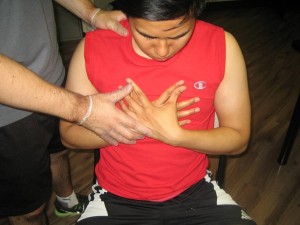A heart attack can occur without any chest pain. Remember that heart failure and heart diseases do not have the same signs for everybody, especially in women. A heart attack occurs once a blood clot blocks the blood flow to the heart muscle. There are various factors that can contribute to a heart attack including heredity, age, high blood pressure, obesity, high cholesterol, stress, alcohol consumption and physical inactivity. The best way to recognize a possible heart attack is to be familiar with the warning signs.
https://www.youtube.com/watch?v=9T4tk-YiRbY
Unusual sweating
Sweating more than usual especially when the individual is not active or not exercising might be a warning sign of heart issues. The pumping of blood via clogged arteries takes more effort from the heart, thus the body has the tendency to sweat more in an attempt to keep the body temperature down during the added exertion. If the individual experiences cold sweats or clammy skin, a doctor should be consulted. In addition, night sweats are also common among women who have heart issues.
Chest pain
Even though chest pain does not occur in all cases, it is the most distinctive symptom. The tightness in the chest is a common indication of a heart attack. It is described as a sensation of crushing in the chest. If the individual experiences chest pain or tightness, call for emergency assistance right away.

Body pain
The tightness and pain can radiate to other areas of the body. It is common to associate a heart attack with pain that radiates to the left arm. This can occur but pain can also manifest in other parts of the body such as the shoulder, upper abdomen, throat, back and jaw.
Fatigue and shortness of breath
The shortness of breath and exhaustion are indications that the body needs to rest but can also be a sign of a heart issue as a response to the added stress on the heart. If the individual feels tired or exhausted for no apparent reason, it can indicate a problem. Take note that shortness of breath and fatigue are common among women and can start months before a heart attack.
Ingestion along with nausea and vomiting
Oftentimes, an individual will start to experience mild indigestion and other gastrointestinal issues before a heart attack. Since a heart attack typically occurs among the elderly who have indigestion issues, these symptoms are often regarded as heartburn or another food-related issue.
What to do during a heart attack?
If you suspect that an individual is having a heart attack, call for emergency assistance right away. In case the individual is prescribed with heart medications and experience heart issues, follow the instructions given by the doctor. By enrolling in a course on first aid, you know the appropriate steps to perform. Remember that prompt treatment of the blockage once the symptoms start, the risk for severe damage is reduced.
